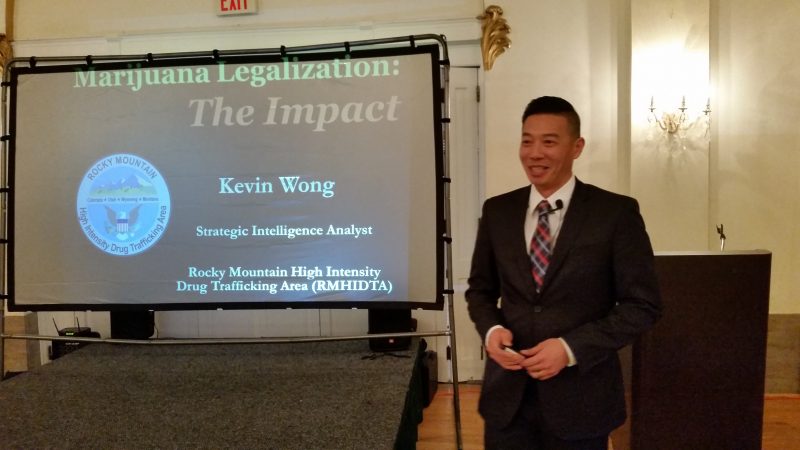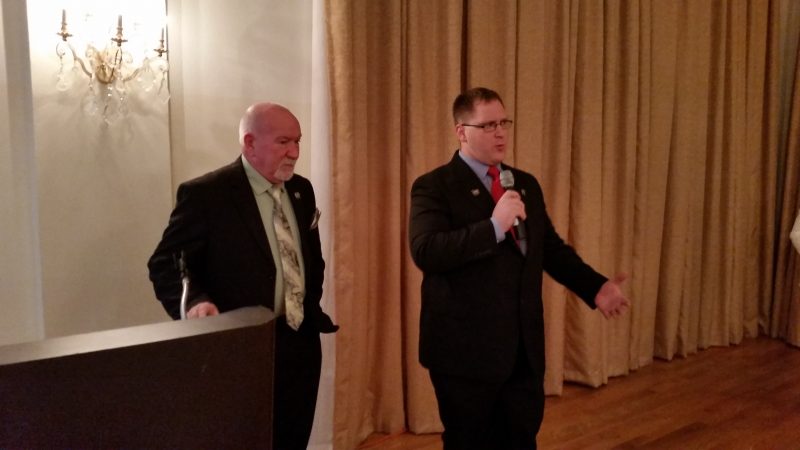State Assemblymen R. Bruce Land, left, and Bob Andrzejczak have made no final decisions about the possible legalization of recreational marijuana in New Jersey.
 By Donald Wittkowski
Kevin Wong ruefully noted that visitors flying to Colorado can arrange to be picked up directly at the airport for special tours of the state’s bumper crop of marijuana dispensaries.
Retail outlets where adults 21 years and older can legally buy pot in Colorado far outnumber the popular Starbucks coffee shops and McDonald’s restaurants dotting the state, Wong also pointed out.
As the first state in the nation to legalize the sale of recreational marijuana, Colorado is now at the forefront of a voter trend sweeping across the country.
But Wong, a Colorado drug analyst and law enforcement official, is sounding a cautionary tale for any state, including New Jersey, that may be flirting with the idea of joining the marijuana movement.
“It’s insane,” he told a legislative forum Wednesday in Ocean City focusing on the legalization of marijuana nationwide.
By Donald Wittkowski
Kevin Wong ruefully noted that visitors flying to Colorado can arrange to be picked up directly at the airport for special tours of the state’s bumper crop of marijuana dispensaries.
Retail outlets where adults 21 years and older can legally buy pot in Colorado far outnumber the popular Starbucks coffee shops and McDonald’s restaurants dotting the state, Wong also pointed out.
As the first state in the nation to legalize the sale of recreational marijuana, Colorado is now at the forefront of a voter trend sweeping across the country.
But Wong, a Colorado drug analyst and law enforcement official, is sounding a cautionary tale for any state, including New Jersey, that may be flirting with the idea of joining the marijuana movement.
“It’s insane,” he told a legislative forum Wednesday in Ocean City focusing on the legalization of marijuana nationwide.
 The audience at the Flanders Hotel included representatives of social services groups, the political world and law enforcement.
Wong is an intelligence analyst for the Rocky Mountain High Intensity Drug Trafficking Area, a task force that tracks the effects of marijuana legalization in Colorado.
Labeling Colorado as a drug experiment gone wrong, Wong cited a litany of social ills allegedly exacerbated by the state’s 2014 foray into legal pot.
Among them, more young people in Colorado are now using marijuana, drug-related traffic fatalities are up, the number of hospital emergency room visits caused by pot overdoses has climbed and drug-related school expulsion rates have jumped, according to Wong.
Focusing attention on another area, Wong also said the tax windfall that was supposed to be created for Colorado by marijuana’s legalization has fallen far short of promises. He said that pot-generated tax revenue, about $140 million in 2016, represented only a miniscule part of the state’s $24 billion budget.
“So, don’t legalize it for money, because it’s not there,” he maintained.
Wong served as the keynote speaker at a marijuana legislative session at the Flanders Hotel organized by Cape Assist and the Cape May County Healthy Community Coalition in partnership with Join Together Atlantic County. The audience included social services experts, drug awareness specialists, lawmakers, school representatives and law enforcement officials.
Cape Assist, a nonprofit substance abuse prevention agency that has served Cape May County for 30 years, organized the forum to generate what it called a “meaningful discussion” about the legalization of marijuana across the country.
“At the end of the day, if your decision is an informed one, then our goal is achieved,” Natalia Wilber, Cape Assist’s healthy community coalition coordinator, told the audience.
The audience at the Flanders Hotel included representatives of social services groups, the political world and law enforcement.
Wong is an intelligence analyst for the Rocky Mountain High Intensity Drug Trafficking Area, a task force that tracks the effects of marijuana legalization in Colorado.
Labeling Colorado as a drug experiment gone wrong, Wong cited a litany of social ills allegedly exacerbated by the state’s 2014 foray into legal pot.
Among them, more young people in Colorado are now using marijuana, drug-related traffic fatalities are up, the number of hospital emergency room visits caused by pot overdoses has climbed and drug-related school expulsion rates have jumped, according to Wong.
Focusing attention on another area, Wong also said the tax windfall that was supposed to be created for Colorado by marijuana’s legalization has fallen far short of promises. He said that pot-generated tax revenue, about $140 million in 2016, represented only a miniscule part of the state’s $24 billion budget.
“So, don’t legalize it for money, because it’s not there,” he maintained.
Wong served as the keynote speaker at a marijuana legislative session at the Flanders Hotel organized by Cape Assist and the Cape May County Healthy Community Coalition in partnership with Join Together Atlantic County. The audience included social services experts, drug awareness specialists, lawmakers, school representatives and law enforcement officials.
Cape Assist, a nonprofit substance abuse prevention agency that has served Cape May County for 30 years, organized the forum to generate what it called a “meaningful discussion” about the legalization of marijuana across the country.
“At the end of the day, if your decision is an informed one, then our goal is achieved,” Natalia Wilber, Cape Assist’s healthy community coalition coordinator, told the audience.

 State Assemblymen R. Bruce Land, left, and Bob Andrzejczak have made no final decisions about the possible legalization of recreational marijuana in New Jersey.
“I believe in the next few years, we’re going to see it,” said state Assemblyman R. Bruce Land, D-Cape May, Cumberland, Atlantic. “But we’re not going to force it down anyone’s throat.”
Land and fellow Assemblyman Bob Andrzejczak, D-Cape May, Cumberland, Atlantic, were at the forum to hear Wong’s remarks. Land said he remains undecided about legalizing recreational marijuana, but Andrzejczak noted he is leaning against it.
“I have not heard anything good come from it,” Andrzejczak said, alluding to Wong’s comments.
Andrzejczak, however, added that he will listen to all sides of the marijuana debate, including what his constituents in the First Legislative District want, before making a final decision.
Cape May County Freeholder Jeff Pierson, who also attended the forum, said he was opposed to legalizing marijuana. He said drug prevention is of paramount importance to help stem the flow of illicit drugs.
“Drug use has grown over the years exponentially,” Pierson said.
State Assemblymen R. Bruce Land, left, and Bob Andrzejczak have made no final decisions about the possible legalization of recreational marijuana in New Jersey.
“I believe in the next few years, we’re going to see it,” said state Assemblyman R. Bruce Land, D-Cape May, Cumberland, Atlantic. “But we’re not going to force it down anyone’s throat.”
Land and fellow Assemblyman Bob Andrzejczak, D-Cape May, Cumberland, Atlantic, were at the forum to hear Wong’s remarks. Land said he remains undecided about legalizing recreational marijuana, but Andrzejczak noted he is leaning against it.
“I have not heard anything good come from it,” Andrzejczak said, alluding to Wong’s comments.
Andrzejczak, however, added that he will listen to all sides of the marijuana debate, including what his constituents in the First Legislative District want, before making a final decision.
Cape May County Freeholder Jeff Pierson, who also attended the forum, said he was opposed to legalizing marijuana. He said drug prevention is of paramount importance to help stem the flow of illicit drugs.
“Drug use has grown over the years exponentially,” Pierson said.